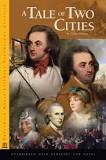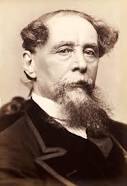A Tale of Two Cities Page #4
A Tale of Two Cities is a historical novel by Charles Dickens, set in London and Paris before and during the French Revolution.
Tellson's Bank had a run upon it in the mail. As the bank passenger--with an arm drawn through the leathern strap, which did what lay in it to keep him from pounding against the next passenger, and driving him into his corner, whenever the coach got a special jolt--nodded in his place, with half-shut eyes, the little coach-windows, and the coach-lamp dimly gleaming through them, and the bulky bundle of opposite passenger, became the bank, and did a great stroke of business. The rattle of the harness was the chink of money, and more drafts were honoured in five minutes than even Tellson's, with all its foreign and home connection, ever paid in thrice the time. Then the strong-rooms underground, at Tellson's, with such of their valuable stores and secrets as were known to the passenger (and it was not a little that he knew about them), opened before him, and he went in among them with the great keys and the feebly-burning candle, and found them safe, and strong, and sound, and still, just as he had last seen them. But, though the bank was almost always with him, and though the coach (in a confused way, like the presence of pain under an opiate) was always with him, there was another current of impression that never ceased to run, all through the night. He was on his way to dig some one out of a grave. Now, which of the multitude of faces that showed themselves before him was the true face of the buried person, the shadows of the night did not indicate; but they were all the faces of a man of five-and-forty by years, and they differed principally in the passions they expressed, and in the ghastliness of their worn and wasted state. Pride, contempt, defiance, stubbornness, submission, lamentation, succeeded one another; so did varieties of sunken cheek, cadaverous colour, emaciated hands and figures. But the face was in the main one face, and every head was prematurely white. A hundred times the dozing passenger inquired of this spectre: “Buried how long?” The answer was always the same: “Almost eighteen years.” “You had abandoned all hope of being dug out?” “Long ago.” “You know that you are recalled to life?” “They tell me so.” “I hope you care to live?” “I can't say.” “Shall I show her to you? Will you come and see her?” The answers to this question were various and contradictory. Sometimes the broken reply was, “Wait! It would kill me if I saw her too soon.” Sometimes, it was given in a tender rain of tears, and then it was, “Take me to her.” Sometimes it was staring and bewildered, and then it was, “I don't know her. I don't understand.” After such imaginary discourse, the passenger in his fancy would dig, and dig, dig--now with a spade, now with a great key, now with his hands--to dig this wretched creature out. Got out at last, with earth hanging about his face and hair, he would suddenly fan away to dust. The passenger would then start to himself, and lower the window, to get the reality of mist and rain on his cheek. Yet even when his eyes were opened on the mist and rain, on the moving patch of light from the lamps, and the hedge at the roadside retreating by jerks, the night shadows outside the coach would fall into the train of the night shadows within. The real Banking-house by Temple Bar, the real business of the past day, the real strong rooms, the real express sent after him, and the real message returned, would all be there. Out of the midst of them, the ghostly face would rise, and he would accost it again. “Buried how long?” “Almost eighteen years.” “I hope you care to live?” “I can't say.” Dig--dig--dig--until an impatient movement from one of the two passengers would admonish him to pull up the window, draw his arm securely through the leathern strap, and speculate upon the two slumbering forms, until his mind lost its hold of them, and they again slid away into the bank and the grave. “Buried how long?” “Almost eighteen years.” “You had abandoned all hope of being dug out?” “Long ago.” The words were still in his hearing as just spoken--distinctly in his hearing as ever spoken words had been in his life--when the weary passenger started to the consciousness of daylight, and found that the shadows of the night were gone. He lowered the window, and looked out at the rising sun. There was a ridge of ploughed land, with a plough upon it where it had been left last night when the horses were unyoked; beyond, a quiet coppice-wood, in which many leaves of burning red and golden yellow still remained upon the trees. Though the earth was cold and wet, the sky was clear, and the sun rose bright, placid, and beautiful. “Eighteen years!” said the passenger, looking at the sun. “Gracious Creator of day! To be buried alive for eighteen years!” IV. The Preparation When the mail got successfully to Dover, in the course of the forenoon, the head drawer at the Royal George Hotel opened the coach-door as his custom was. He did it with some flourish of ceremony, for a mail journey from London in winter was an achievement to congratulate an adventurous traveller upon. By that time, there was only one adventurous traveller left be congratulated: for the two others had been set down at their respective roadside destinations. The mildewy inside of the coach, with its damp and dirty straw, its disagreeable smell, and its obscurity, was rather like a larger dog-kennel. Mr. Lorry, the passenger, shaking himself out of it in chains of straw, a tangle of shaggy wrapper, flapping hat, and muddy legs, was rather like a larger sort of dog. “There will be a packet to Calais, tomorrow, drawer?” “Yes, sir, if the weather holds and the wind sets tolerable fair. The tide will serve pretty nicely at about two in the afternoon, sir. Bed, sir?” “I shall not go to bed till night; but I want a bedroom, and a barber.” “And then breakfast, sir? Yes, sir. That way, sir, if you please. Show Concord! Gentleman's valise and hot water to Concord. Pull off gentleman's boots in Concord. (You will find a fine sea-coal fire, sir.) Fetch barber to Concord. Stir about there, now, for Concord!” The Concord bed-chamber being always assigned to a passenger by the mail, and passengers by the mail being always heavily wrapped up from head to foot, the room had the odd interest for the establishment of the Royal George, that although but one kind of man was seen to go into it, all kinds and varieties of men came out of it. Consequently, another drawer, and two porters, and several maids and the landlady, were all loitering by accident at various points of the road between the Concord and the coffee-room, when a gentleman of sixty, formally dressed in a brown suit of clothes, pretty well worn, but very well kept, with large square cuffs and large flaps to the pockets, passed along on his way to his breakfast. The coffee-room had no other occupant, that forenoon, than the gentleman in brown. His breakfast-table was drawn before the fire, and as he sat, with its light shining on him, waiting for the meal, he sat so still, that he might have been sitting for his portrait.
Translation
Translate and read this book in other languages:
Select another language:
- - Select -
- 简体中文 (Chinese - Simplified)
- 繁體中文 (Chinese - Traditional)
- Español (Spanish)
- Esperanto (Esperanto)
- 日本語 (Japanese)
- Português (Portuguese)
- Deutsch (German)
- العربية (Arabic)
- Français (French)
- Русский (Russian)
- ಕನ್ನಡ (Kannada)
- 한국어 (Korean)
- עברית (Hebrew)
- Gaeilge (Irish)
- Українська (Ukrainian)
- اردو (Urdu)
- Magyar (Hungarian)
- मानक हिन्दी (Hindi)
- Indonesia (Indonesian)
- Italiano (Italian)
- தமிழ் (Tamil)
- Türkçe (Turkish)
- తెలుగు (Telugu)
- ภาษาไทย (Thai)
- Tiếng Việt (Vietnamese)
- Čeština (Czech)
- Polski (Polish)
- Bahasa Indonesia (Indonesian)
- Românește (Romanian)
- Nederlands (Dutch)
- Ελληνικά (Greek)
- Latinum (Latin)
- Svenska (Swedish)
- Dansk (Danish)
- Suomi (Finnish)
- فارسی (Persian)
- ייִדיש (Yiddish)
- հայերեն (Armenian)
- Norsk (Norwegian)
- English (English)
Citation
Use the citation below to add this book to your bibliography:
Style:MLAChicagoAPA
"A Tale of Two Cities Books." Literature.com. STANDS4 LLC, 2024. Web. 24 Nov. 2024. <https://www.literature.com/book/a_tale_of_two_cities_19>.




Discuss this A Tale of Two Cities book with the community:
Report Comment
We're doing our best to make sure our content is useful, accurate and safe.
If by any chance you spot an inappropriate comment while navigating through our website please use this form to let us know, and we'll take care of it shortly.
Attachment
You need to be logged in to favorite.
Log In